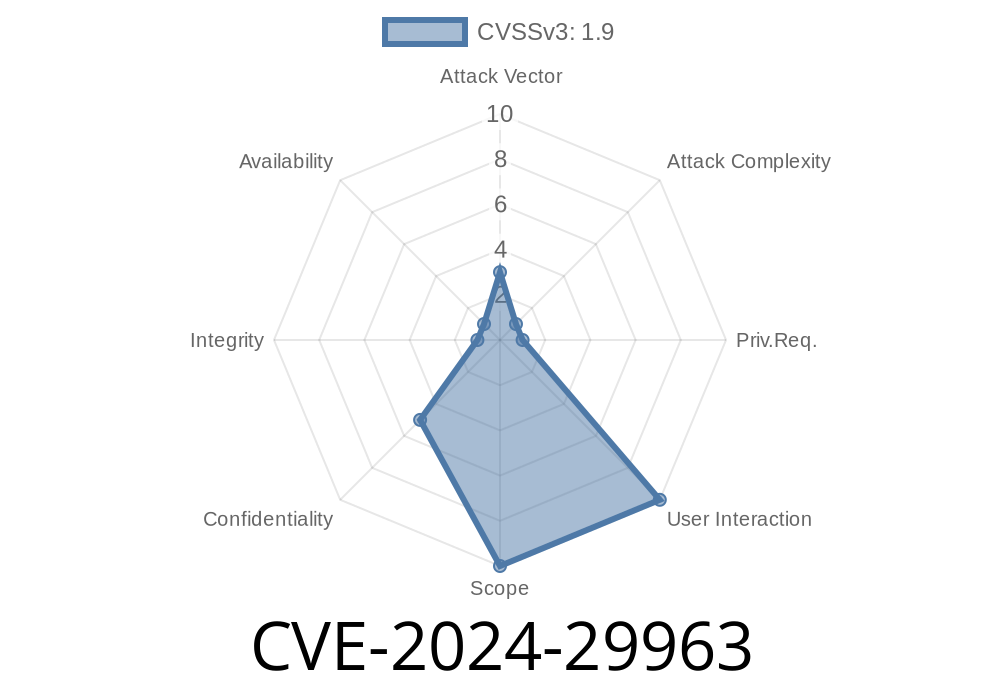---
Brocade's SANnav is a widely used SAN (Storage Area Network) management suite, providing monitoring and automation for storage networks. In early 2024, a new security vulnerability, CVE-2024-29963, was revealed, affecting SANnav OVA deployments before version 2.3.1 and version 2.3.a. This post dives into what happened, why it's risky, what attackers could do, and how to protect your environment. We'll also include the original sources, code snippets, and practical advice—explained in simple, clear language.
What is CVE-2024-29963?
CVE-2024-29963 is a vulnerability where certain versions of Brocade SANnav OVA (Open Virtual Appliance) included hardcoded TLS keys for Docker. Docker uses TLS keys to secure communications such as API requests and connections between containers and services. Using the same TLS keys universally is a big security risk because anyone with those keys can potentially intercept or spoof secure traffic.
Brocade SANnav v2.3.a
_Brocade documentation clarifies that SANnav does not interact with remote Docker registries out-of-the-box, which does reduce—but not eliminate—the severity in standard deployment._
Why Are Hardcoded TLS Keys Dangerous?
TLS (Transport Layer Security) keys function like a padlock and key on your data. If every house on the block uses the same key, then stealing one key means you can open every house. In this CVE, Docker’s TLS certs and private keys are not randomly generated per installation: they are the same on every vulnerable appliance.
This means
- Malicious actors who possess a copy of the hardcoded key can decrypt Docker traffic if they intercept it.
- Attackers could impersonate trusted services or inject malicious containers if Docker API is exposed.
The OVA file contains a Docker configuration like the following (example code snippet)
$ ls /etc/docker
ca.pem cert.pem key.pem
These three files should be unique for every installation and generated during setup. However, SANnav OVA before v2.3.1 ships the same versions of these files for every customer.
Here's a conceptual snippet of the code used
# Vulnerable snippet (how config might be applied)
cp /opt/sannav/defaults/docker/cert.pem /etc/docker/cert.pem
cp /opt/sannav/defaults/docker/key.pem /etc/docker/key.pem
cp /opt/sannav/defaults/docker/ca.pem /etc/docker/ca.pem
Because these files are the same, they’re vulnerable to replay and impersonation attacks. Security best practices dictate creating unique certs with something like:
# Best practice
openssl req -newkey rsa:4096 -nodes -keyout key.pem -x509 -days 365 -out cert.pem
How Could This Be Exploited? (Attack Scenario)
1. Attacker obtains the hardcoded private key (by extracting from a distributed OVA or public repo).
2. Interception: If a LAN attacker can access the Docker API endpoint (uncommon, but possible if the endpoint is exposed or local containers run attacker code), they can:
Potentially inject malicious containers by forging API requests as "trusted server."
3. Post-compromise: Once inside the Docker-controlled namespace, attackers may access more sensitive data or pivot into the host operating system.
It’s important to note: In a default Brocade SANnav deployment, Docker doesn’t access the external internet or cloud registries. This reduces the chance of mass exploitation—but internal attacks in less-protected data center networks are *still a risk*.
References and Original Advisories
- NIST CVE Detail for CVE-2024-29963
- Broadcom/Brocade Security Advisory PDF
- OpenWall CVE
- Mitre CVE Record
How to Fix and Protect Your SANnav Deployment
Upgrade Now:
If you’re running a vulnerable version, upgrade to SANnav OVA 2.3.1 or later, where unique TLS certs are generated per install.
Temporary Mitigation:
Regenerate certs with
cd /etc/docker
sudo openssl req -newkey rsa:4096 -nodes -keyout key.pem -x509 -days 365 -out cert.pem
sudo systemctl restart docker
Audit Network Exposure:
Ensure your Docker API is not exposed externally, and restrict any internal network access as much as feasible.
Inventory and Monitoring:
Monitor your network for signs of unauthorized Docker API connections or unexpected containers.
Final Thoughts
While Brocade SANnav’s Docker usage is mostly internal, the presence of hardcoded TLS keys is a serious risk, especially in sensitive environments where attackers might have some internal access. The best defense is immediate upgrade, and regular audits of your appliance configurations.
Tell your security team, patch now, and stay safe!
*This was an exclusive breakdown for CVE-2024-29963. For more updates and exclusive insights on new SAN vulnerabilities, follow and subscribe!*
Timeline
Published on: 04/19/2024 04:15:10 UTC
Last modified on: 06/18/2024 18:11:24 UTC
